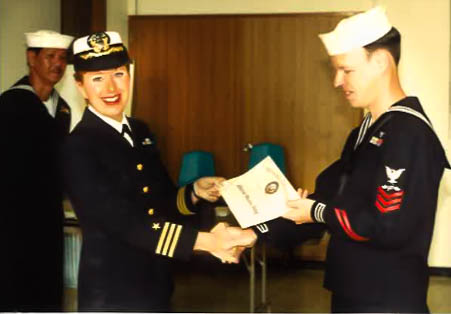Naval Commander retires, helps inspires veterans to look forward to life after the military
Faculty spotlight

November 13, 2015
Patricia Reily, Director of the Veterans Center, dedicated 20 years of her life to the Navy before retiring as a commander, giving up what she loved most in order to be with her family.
Reily received her bachelor’s degree in Journalism from the University of Minnesota with a minor in Political Science. After working as a journalist, she joined the Navy in 1974 and went to Officer Candidate School at the end of Vietnam.
During this time there were many views on the war in Vietnam.
“I wanted to join the military to check it out and see it from the other side and I wanted to do what I could to support that group of people,” said Reily.
While active, Reily was sent to many places including a naval air station in Northern California, the Philippines, San Diego, San Francisco, Philadelphia, Rhode Island and Japan.
While in the Navy she attended graduate school in order to obtain her masters in Organizational Analysis at the Navy postgraduate school. After that, she received another master’s degree in Global Security and Strategic Planning at the Naval War College. But her education wasn’t finished yet; after receiving two master’s degrees, she went to the University of San Francisco to get her doctorate in Education.
During her educational career, while in the military, Reily did the Navy’s first study on sexual harassment, wrote the Navy’s first policy on sexual harassment and did the Navy’s first workshop on sexual harassment. It is these accomplishments that she deems the highlight of her military career.
“Doing the first study on sexual harassment and making women and men in the military aware of what sexual harassment was, was a highlight because we didn’t even have a word for it in those days,” said Reily.
Reily advanced quickly through her military career; however, she was married with children and the demands of a military career became very difficult on her family.
Reily said, even though she loved the Navy, in her heart she felt that she could no longer put her career first, because it wasn’t fair to her family.
“To wake up in the middle of the night and think, ‘I can’t do this to my family anymore’ was a pivotal moment. I accepted the orders. I was going to do it. It would mean that I was going to move up north, and my family was going to stay here [San Diego], and my husband was going to take over the primary care of the kids.
“After I made this decision, I felt this loss, a void, a pain to give up something I had wanted to do. It was that transition after the military that was really difficult, that’s why I love my job now, because I’m helping others make that transition and showing them that there’s life after the military,” said Reily.
Reily said that her time in the military has taught her many things including being part of something bigger than herself, taking care of people, trusting in colleagues, flexibility, integrity, not playing the victim, taking control of her life and creating an appreciation for diversity.
Since she has been out, Reily has been working with the military population to help make a difference in their lives and make a connection with them, as she is no stranger to the feeling that veterans get transitioning back into civilian life.
“I learned a lot about leadership, management, myself; I learned that I could do things that I never thought I could do. The Navy made me do it and I wouldn’t have done it on my own, and I had great confidence as a result of the Navy making me do it.”

